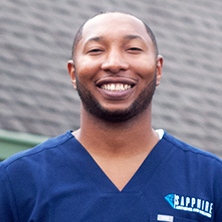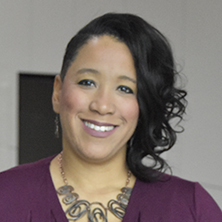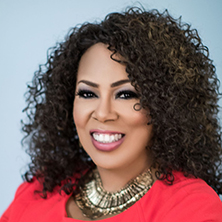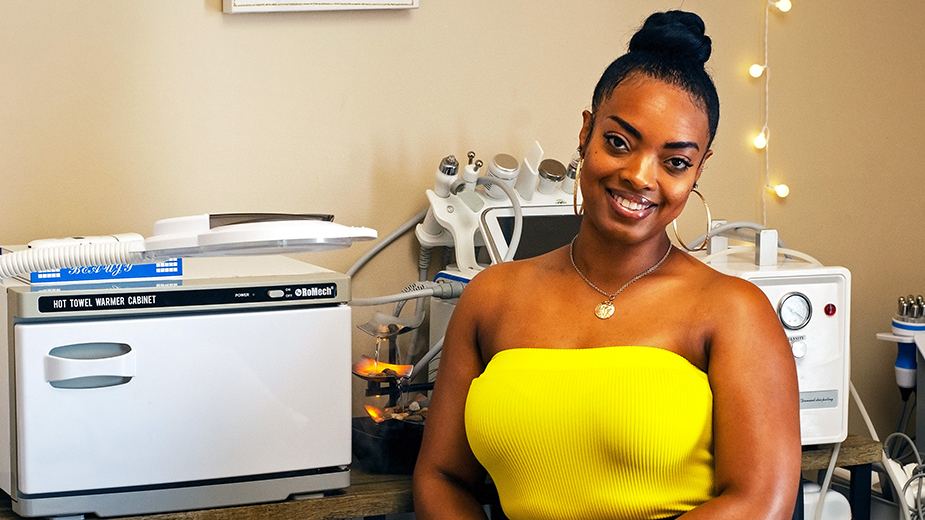YOUNGSTOWN, Ohio – Systemic challenges and microaggressions are a few of the obstacles local Black entrepreneurs face when entering the business community – but they’re not backing down.
The Business Journal spoke to four Black entrepreneurs, all of whom started their own businesses and faced similar trials and tribulations. Their experiences reflected national statistics and studies of common challenges facing Black businesses owners. The most common and impactful challenges were funding startup costs, brand visibility and stereotypes and stigmas that plague the Black community.
Despite these systemic challenges, all four operate successful businesses with plans of expansion and growth.
Tiffany Robinson, owner of LilysFlow, says that success is only possible if you jump in headfirst. “Just do it – don’t second guess yourself. Tackle it, go after it,” she says. “You just have to get up and do it.”
SETTING AN EXAMPLE
Robinson says access to capital was her biggest hurdle when starting LilysFlow, a rejuvenation spa in Girard, a year ago. Access to capital is a common challenge for Black entrepreneurs looking to start their own businesses. According to the Federal Reserve, 80.2% of White business owners receive at least a percentage of the funding they request from a bank, compared to 66.4% of Black, indigenous and people of color.
“It’s hard to find funding. I think that’s the biggest roadblock that I’ve found. A lot of times you have to have a long, established record,” Robinson says. “But you have to start somewhere, you know. So it’s kind of like finding ones that are willing to give you that information, that guidance to help you get your foot in the door to be able to have that long record to get the funding.”
Robinson says she has attempted to use local resources such as the Minority Business Assistance Center, but she wishes resources were more streamlined. She suggests local resources for small business be combined and accessible in one place to make things less “scattered.”
Robinson felt a need to prove herself to be knowledgeable and skillful, she says. “I feel like sometimes you have to go above and beyond to prove yourself and that you have the expertise to effectively make a service,” she says. “You have to put yourself forward. You should do that anyway. But you really have to make sure that you’re doing that constantly.”
Robinson went back to school to become an esthetician shortly before turning 40. She was on a mission to rebrand her life after leaving a marriage of 15 years. She spent years healing both herself and her children, and now she wants to share what she learned.
“I restarted my whole entire life with two children. I know the back and forth in your mind and the self-criticism, I know all about it,” she says. “I know feeling so beat down that you don’t think you’re worth anything – I lived it.”
Robinson started LilysFlow in a leap of faith to help build the confidence and self-esteem of women – something that took her years to find again. But her services go beyond facials, massages and detoxes.
The LilysFlow Mentoring Experience is a mentorship program that Robinson is trying to get off the ground and into local schools. It’s still in the startup stages, but she has dreams of going national. She says she wants to give Youngstown youth positive role models to show them that they’re capable of more.
“We’re not showing them that a different way of life is highly attainable for them. All they know is, go to the streets. I want to present a different way for them,” she says.
And she wants to extend her mentorship to domestic violence shelters to help women start over like she did.
“We go through things in life, and we go through those things to help other people to get through their things. It would be selfish of me to have gone through everything that I went through and not try to do something good with it,” she says. “I just want people to live their best life and to know that they’re worth something.”
WALKING BY FAITH
Terrill Vidale, owner and CEO of 2Deep Entertainment and 2DE Estates, says he was racially profiled when he applied for a business loan.

“They view a young, African American man with business desires and there’s always a question of ‘Well, is he doing it legally?’ And they always try to look at your lineage,” he says. “If I was some young, white kid with a huge lineage, then everyone would be helping me.”
At 12-years-old, Vidale moved to the north side of Youngstown from Trinidad and Tobago. His mother attended Youngstown State University on a student visa. Due to her status, she couldn’t work off-campus. The financial strain of being a single mother and not being allowed to work led the family to live at the Beatitude House. He says walking by faith put him onto a path out of homelessness and into his own business empire.
“I didn’t know if it was going to work out for me, but I just had the faith that if God’s with me, nothing could be against me. So I went forward and did it,” Vidale says about his venture into the entertainment business in 2013.
2Deep Entertainment, a talent booking and event management agency, was his first entrepreneurial leap of faith. He named the company after his deep relationship with God that he says is the core of his success in business and in life.
The pandemic forced Vidale to pivot, but he says it was an opportunity to pursue a lifelong interest: real estate.
“So, when COVID-19 happened, the entertainment business went to zero. So, I said, ‘You know, Terrill, you always wanted to do things in real estate. You never had the time because you’re always busy with entertainment,’ ” he says. “Well, guess what? My schedule just got cleared.”
Vidale set up his real estate company, 2Deep Estates, in Canfield, a city that is nearly 90% White according to the most recent census data. He says the village has been welcoming, particularly the administration.
While he believes the intentions of Canfield residents are good, he does recognize a level of ignorance about the Black community. He says most of the slights come from a lack of awareness. He adds that in general, those in positions of power over capital such as banks might not understand the struggles of the Black community. According to a report from the Committee for Better Banks, an advocacy group, Black and Latino employees have a significantly smaller chance of holding an executive position in corporate banks in comparison to their White counterparts.
“A lot of people try to make decisions on African American people, but have never been faced with the same things that an African American person is faced with. So now you have people in places that are making decisions on people’s lives that they never lived,” Vidale says. “Maybe they didn’t have the same parents that you had, maybe they didn’t have both parents. Maybe their parents didn’t teach financial literacy or about credit.”
Vidale took advantage of services provided by the Minority Business Assistance Center. His businesses are Minority Business Enterprise certified, which he says every minority business should do. The state of Ohio’s MBE program assists minority businesses in obtaining state government contracts for goods and services. The state developed the program to encourage, nurture and support the growth of minority businesses to foster their development and increase the number of qualified competitors in the marketplace, according to the state website.
“Without them, I don’t know where I’d be today,” Vidale says.
DIVERSITY ISN’T BLACK AND WHITE
Jaietta Jackson says a main challenge when starting her business, one2one Communication Consulting, was getting it recognized.

“For small Black businesses, it’s difficult to legitimize our businesses because people tend to go to a bigger business. They don’t realize that you get one-on-one interaction when you go for a smaller Black business,” she says.
The importance of supporting Black-owned businesses has been emphasized in recent years, especially during the rise of the Black Lives Matter movement following the killing of George Floyd. The COVID-19 pandemic also caused significant strain on Black businesses and exacerbated systemic issues, such as access to capital. Forbes reports that in order to generate long-term impact, it’s critical to foster wide-scale, intentional support of these businesses year-round.
Jackson’s business is a communication consulting company that focuses on Diversity, Equity, and Inclusion training and public speaking. Companies often hire her to train them in DEI, and she says the most common mistakes businesses make is believing that it’s a one-and-done deal.
“They think that one idea covers everything, and a lot of times people think they’re diverse and they’re not really as diverse as they think,” she says. “I’m trying to help people understand their own selves, because if you don’t understand where you are, who you are, and where you’re coming from, then you make the biggest faux pas and you don’t handle situations accordingly.”
Jackson says it’s not as important for businesses to have a racially diverse staff as it is for the employees to understand who they and their clients are, and it doesn’t matter if the patron “looks like” the employee. She says it matters more that the employees know how to interact with the clients, regardless of race.
Race is not the only factor involved in diversity, and discrimination extends beyond race, Jackson says. Diversity encompasses religion, age, culture, sexual orientation, gender, language, education and skills and abilities. She says that someone can even be discriminated against for being too educated, and discrimination is more complex than it appears.
“I think the biggest downfall, or the biggest issue is people not understanding that it’s not just one thing. All diversity and inclusion issues are that way,” Jackson says.
MICROAGGRESSIONS IN THE COURTROOM
Attorney Kim Akins says that she faces microaggressions when walking into the courtroom, and occasionally she’s mistaken for the defendant.

“I walk in the courtroom and some deputy will walk up when I go sit at counsel table and will tell me that defendants or their girlfriends have to sit in the back,” she says. “When I walk into the courtroom, particularly on criminal cases, I am frequently the only Black person that’s there who is not there as a defendant, and I know that mindset is there in the courtroom.”
Akins started practicing law in the early 1990s, a time when women, especially women of color, were few and far between in the legal field. She says sexism and racism were part of her daily life in the courtroom, and while it’s not as rampant today, she still faces microaggressions while trying to do her job.
Historically, the legal profession is one of the least diverse professions in the nation, according to the American Bar Association. In 2021, the percentage of female attorneys increased to 37% from 33% in 2011, the ABA reports. The percentage of Black attorneys decreased slightly from 4.8% in 2011 to 4.7% last year – far lower than the more than 13% of Americans who are Black.
Akins says that part of the issue is a lack of diversity in the field and from some affluent local communities. She says that many of the magistrates and judges come from communities that are not diverse and are “not grounded in the idea that there is a wide range of professionalism in the Black community. And they don’t see that it’s possible for there to be Black lawyers walking into the courtroom.”
According to the ABA, racial and ethnic diversity in the legal profession is necessary to demonstrate that laws are being made and administered for the benefit of all persons. Because the public’s perception of the legal profession often informs impressions of the legal system, a diverse bar and bench create greater trust in the rule of law.
Akins says that there is less leeway for “someone that looks like me.” She says she can’t afford to make rookie mistakes, and she tries her best to keep her head down, know her cases, do the work and try to maintain the respect of the local bar and the local bench.
Akins, who is a private practitioner, says she’s treated well by judges and it’s “been a while since I’ve had an obvious and overt slight from the bench or from opposing counsel. But I know that when I’m not in the room, things get said.”
She says the only way for the legal world, and society, to change is education. She adds that multiple local and minority bar associations have been petitioning the Ohio Supreme Court to make diversity and inclusion training a mandatory program for lawyers and judges.
“Once they become conscious that there’s more that exists than in their little world, hopefully that will translate into how they deal with the people that come before them or clients that come in their doors.”
Pictured at top: Tiffany Robinson says “put yourself forward.”
